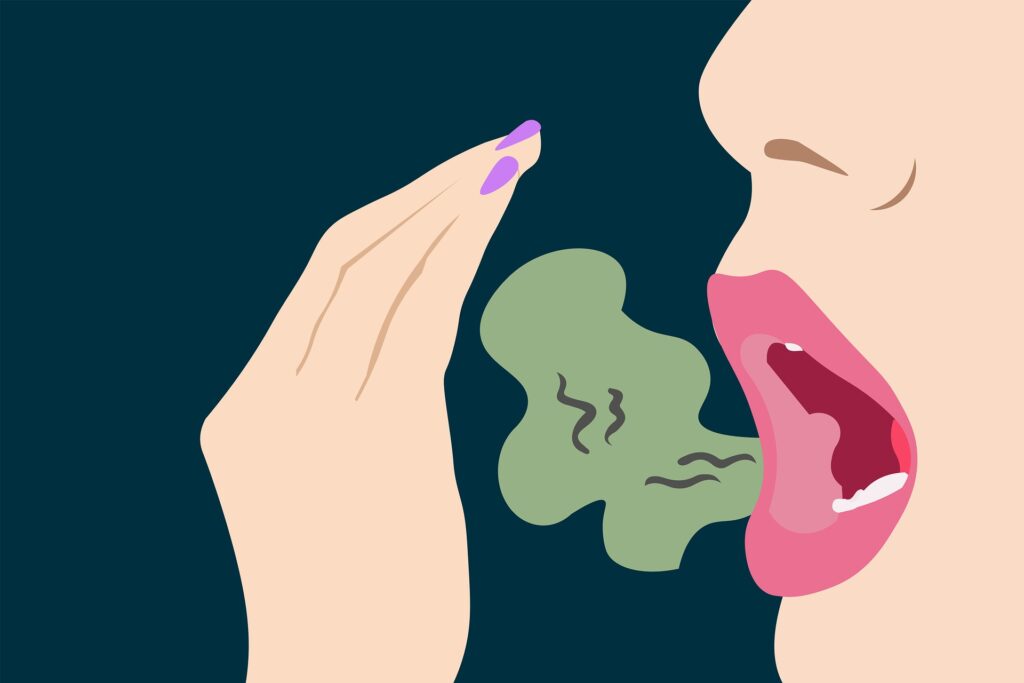common causes of bad breath and how to prevent and treat them.
Bad breath or halitosis is a common condition that affects many people. It can be a frustrating and embarrassing issue that can negatively affect a person’s confidence and self-esteem. Bad breath can be caused a range of factors, such as inadequate dental care, eating habits, health issues, and lifestyle preferences, can lead to the development of halitosis. In this essay, we examine the most common causes of bad breath and how to prevent and treat them.
Neglecting Oral Health :
How Poor Oral Hygiene Contributes to Bad Breath is One of the most common issues .If you don’t brush and floss regularly, food particles can get stuck in your teeth and gums, causing the growth of bacteria that cause unpleasant odors. Brushing your teeth twice a day and flossing at least once a day can help remove food particles and prevent bacterial growth. Using a mouthwash can also help kill bacteria and freshen your breath.
Dining options :
What you eat can also affect the freshness of your breath. Foods like garlic, onions, and spices can cause bad breath because they contain compounds that are absorbed into the bloodstream and released when you exhale.These odors can linger in your mouth for hours, even after you brush your teeth. Avoiding these foods or limiting their consumption can help reduce bad breath.
Poor dental hygiene, such as infrequent brushing and flossing, can result in the buildup of plaque and bacteria in the mouth, leading to unpleasant breath.
diseases:
Medical Conditions and Bad Breath. For example: Poor dental hygiene, such as infrequent brushing and flossing, can result in the buildup of plaque and bacteria in the mouth, leading to unpleasant breath. Other conditions that can cause bad breath include sinus infections, respiratory infections, and gastrointestinal problems.To exclude any potential medical issues, it is recommended to consult with a dentist or physician to rule out underlying medical conditions.
Habits:
Smoking and alcohol consumption can also contribute to bad breath. Smoking not only causes bad breath, but also stains teeth and increases the risk of gum disease and oral cancer. Alcohol can cause dehydration, leading to dry mouth, which can also contribute to bad breath. If you smoke or drink alcohol, quitting or reducing it can help improve the freshness of your breath.
dry mouth:
Insufficient saliva in the oral cavity results in dry mouth or xerostomia. Saliva helps wash away food debris and bacteria, so bad breath can develop when there isn’t enough saliva. Dry mouth can be caused by certain medications, medical conditions, and lifestyle choices such as smoking or drinking alcohol. Drinking plenty of water, chewing sugarless gum, and using a saliva substitute can help relieve dry mouth and reduce bad breath.
dental problems:
Dental problems such as tooth decay, gum disease, and oral infections can also cause bad breath. These issues create an environment for bacteria to thrive, resulting in unpleasant odors. Regular dental check-ups and tooth cleaning can help prevent dental problems and reduce bad breath.
Other causes:
Other causes of halitosis include certain medical treatments such as chemotherapy, radiation therapy and some medications. Stress, hormonal changes and fasting can also cause bad breath. These causes are less common but should still be considered if bad breath persists despite good oral hygiene habits and lifestyle changes.
Managing Halitosis:
Preventing and treating bad breath includes good oral hygiene habits and lifestyle changes. Here are some tips to prevent and treat bad breath:
1- Brush your teeth twice a day and floss at least once a day to remove food debris and bacteria.
2- Use a mouthwash to kill bacteria and freshen your breath.
3- Hydrate Your Mouth with Water.
4- Avoid foods that can cause bad breath such as garlic, onions and spices.
5- Quit smoking or reduce your alcohol consumption to improve the freshness of your breath.
6- Visit your dentist regularly for check-ups and cleanings to prevent dental problems.
7- If you have dry mouth, use a saliva substitute and chew sugar-free gum to increase saliva production.
8- If you have an underlying medical condition, seek treatment to improve your overall health and reduce bad breath.
9- Manage stress through relaxation techniques such as meditation or yoga.
10- Adopt a healthy lifestyle, such as a balanced diet and regular exercise, to improve your overall health and reduce bad breath.
In summary, bad breath is a common condition that can be caused by poor oral hygiene, dietary habits, medical conditions and lifestyle habits.Preventing and treating bad breath requires good oral hygiene habits, lifestyle changes, and finding treatment for underlying conditions. By taking care of your oral hygiene and choosing a healthy lifestyle, you can enjoy fresh breath and a healthy smile. Remember that fresh breath not only improves your oral health, but also boosts your confidence and social interactions.

